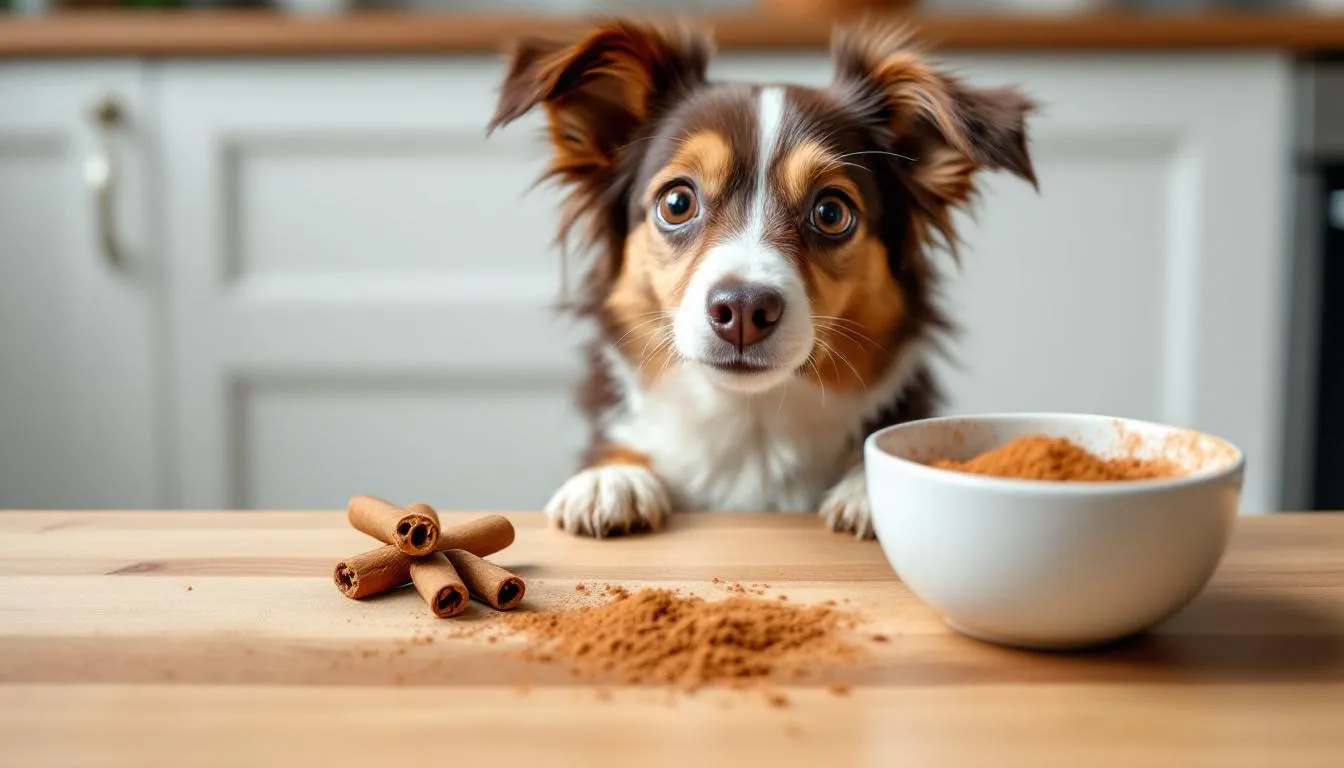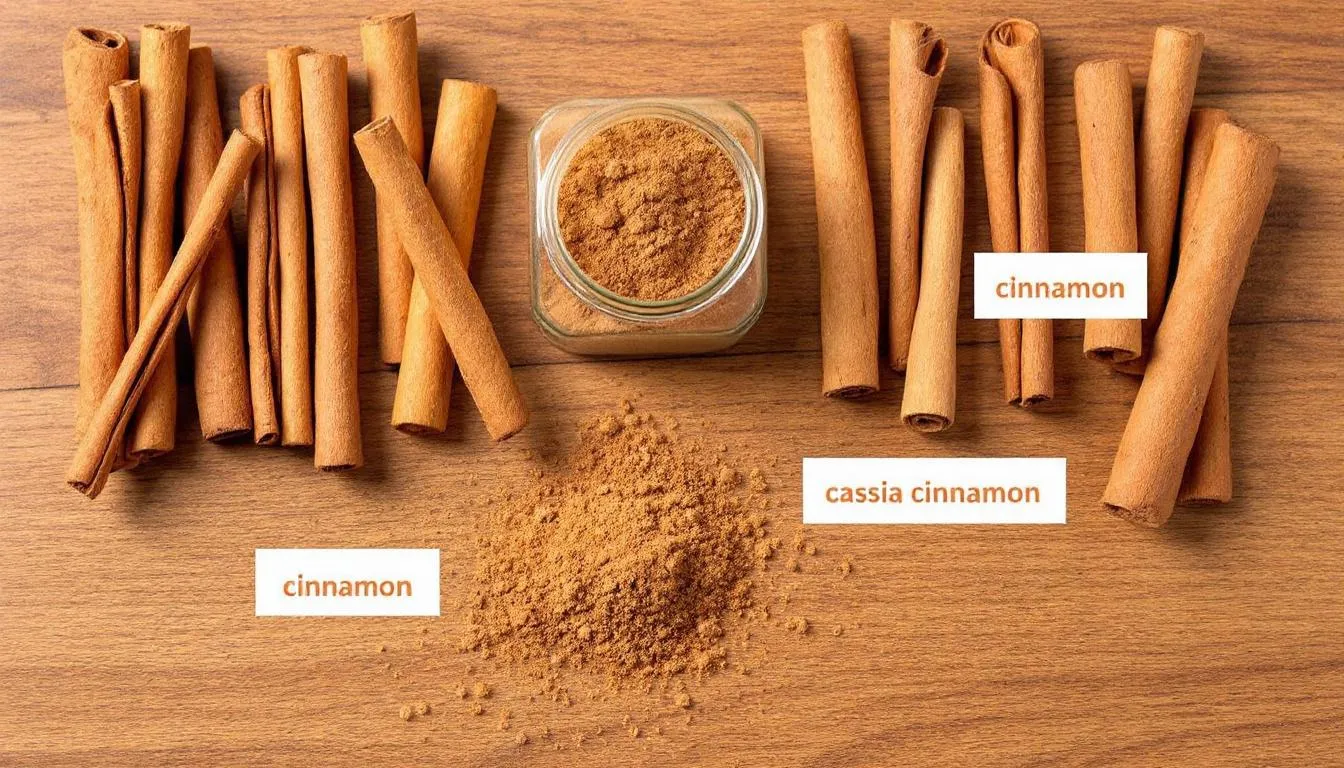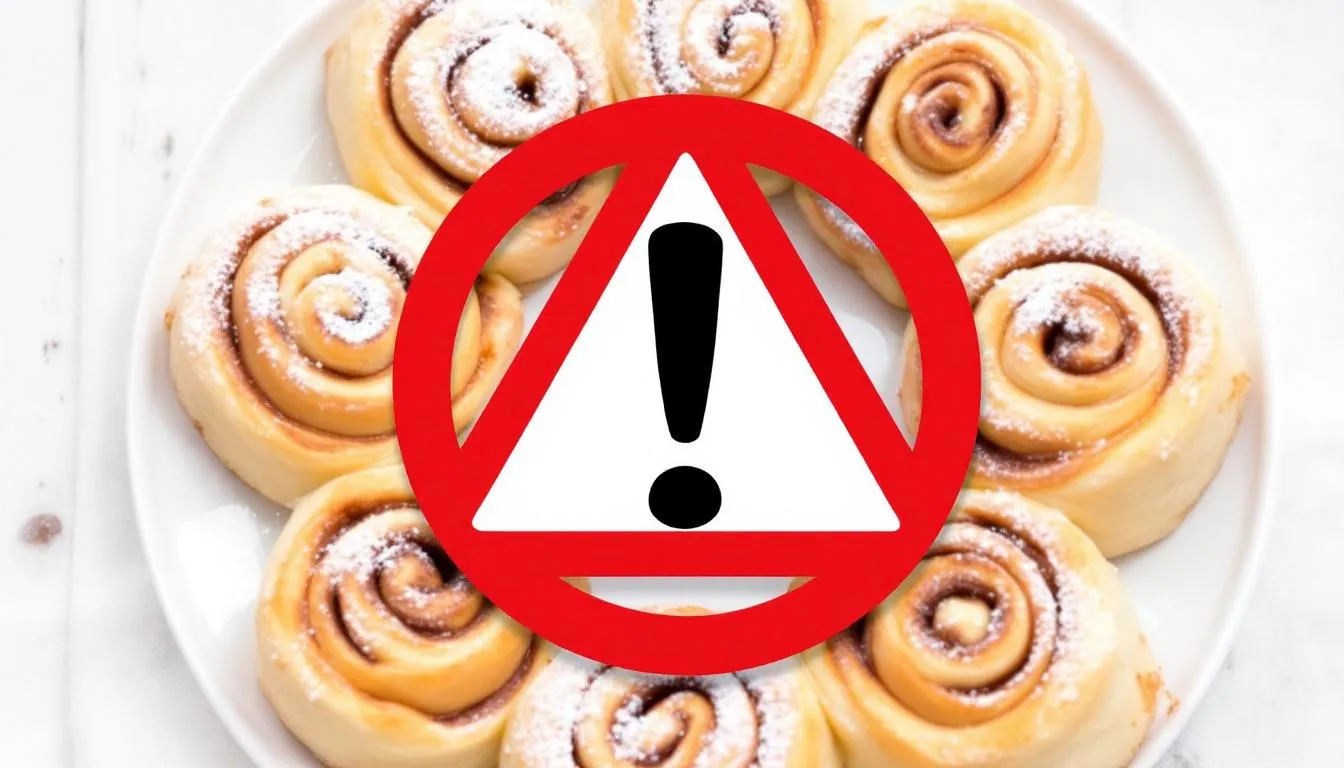

Key Takeaways
Cinnamon is not toxic to dogs when given in small amounts, but can cause problems if consumed excessively
- Cinnamon is not toxic to dogs when given in small amounts, but can cause problems if consumed excessively
- While cinnamon is not among the certain foods that are toxic to dogs, caution is still needed when introducing it, and you should monitor for any adverse reactions
- Ceylon cinnamon is safer than cassia cinnamon due to lower coumarin levels that can harm the liver
- Cinnamon essential oils and large amounts of cinnamon powder can be dangerous—even though cinnamon itself is not considered cinnamon toxic, certain forms and excessive quantities can be harmful and cause breathing difficulties
- Dogs should not eat cinnamon baked goods like rolls or cookies due to harmful ingredients like xylitol, sugar, and nutmeg
- Always consult your veterinarian before adding cinnamon to your dog’s diet
While cinnamon is not among the certain foods that are toxic to dogs, caution is still needed when introducing it, and you should monitor for any adverse reactions
Ceylon cinnamon is safer than cassia cinnamon due to lower coumarin levels that can harm the liver
Cinnamon essential oils and large amounts of cinnamon powder can be dangerous—even though cinnamon itself is not considered cinnamon toxic, certain forms and excessive quantities can be harmful and cause breathing difficulties
Dogs should not eat cinnamon baked goods like rolls or cookies due to harmful ingredients like xylitol, sugar, and nutmeg
Always consult your veterinarian before adding cinnamon to your dog’s diet
You’re making cinnamon toast and your dog gives you those irresistible eyes. Before you share a bite, you wonder: is cinnamon bad for dogs? The short answer is that cinnamon isn’t inherently dangerous for most pets, but like many people foods, it requires careful consideration and moderation.
This comprehensive guide covers everything pet parents need to know about cinnamon safety for dogs. From understanding different types of cinnamon to recognizing emergency symptoms, you’ll get clear, practical information to keep your furry friend safe while making informed decisions about their diet.
Introduction to Cinnamon
Cinnamon is a beloved spice found in kitchens around the world, prized for its warm flavor and inviting aroma. It’s a staple in baking and cooking, but when it comes to sharing this spice with your dog, many pet parents wonder if it’s safe. The answer is yes—dogs can have cinnamon, but only in moderation and with careful attention to the type and amount used. While cinnamon can offer potential health benefits, such as supporting overall wellness, it can also cause adverse reactions if given in excessive amounts. Not all cinnamon is created equal: Ceylon cinnamon is considered safer for dogs than cassia cinnamon, which contains higher levels of coumarin—a compound that can be harmful in large doses. Additionally, cinnamon essential oil is highly concentrated and can be dangerous for dogs, even in small quantities. Understanding these differences helps pet parents make informed choices about adding cinnamon to their dog’s diet, ensuring their furry friends enjoy the spice safely.
Is Cinnamon Safe for Dogs?
The answer is yes—dogs can have cinnamon in small quantities without immediate harm. When dogs eat cinnamon in moderation, it is generally safe, but pet parents should be aware of the potential risks and monitor their pets for any unusual symptoms. Ground cinnamon in minimal amounts is generally safe for most pets, but several important factors determine whether it’s appropriate for your specific dog.
Ceylon cinnamon stands out as the safer choice compared to the more common cassia cinnamon. The key difference lies in coumarin content—a compound that can damage the liver and kidneys when consumed regularly or in larger amounts. Ceylon cinnamon contains significantly lower coumarin levels, making it the preferred option if you choose to give your dog cinnamon.
The safety of cinnamon largely depends on the amount consumed and the specific product involved. While a tiny sprinkle of ground cinnamon won’t hurt most dogs, the same can’t be said for cinnamon essential oil or large quantities of cinnamon powder. Dogs with existing respiratory issues should avoid cinnamon entirely to prevent breathing complications.
Most pets tolerate small doses of plain cinnamon without adverse reactions, but individual sensitivity varies. While some dogs have cinnamon without issue, others may experience digestive upset or other adverse reactions even at low doses.


Types of Cinnamon and Their Safety Levels
Understanding the different forms of cinnamon helps you make informed decisions about what’s safe for your dog’s diet.
Ceylon Cinnamon earns the title of “true cinnamon” for good reason. This lighter, sweeter variety contains minimal coumarin—typically less than 10 mg per kilogram of spice. For pet parents who want to occasionally feed cinnamon to their dogs, Ceylon cinnamon presents the lowest risk option. Always feed cinnamon in a smaller amount to minimize the risk of adverse reactions, especially when introducing it to your dog's diet.
Cassia Cinnamon dominates grocery store shelves but poses greater risks for dogs. This common variety contains 2,000 to 5,000 mg of coumarin per kilogram—up to 250 times more than Ceylon cinnamon. Regular consumption of cassia cinnamon can strain your dog’s liver and kidneys over time.
Ground Cinnamon Powder offers the most controllable dosing when used sparingly. However, inhaling cinnamon powder creates serious respiratory risks, causing coughing, choking, and potential lung irritation. Store cinnamon powder securely in your spice cabinet to prevent accidental exposure.
Cinnamon Sticks present unique hazards despite seeming more natural. Dogs who chew cinnamon stick fragments risk mouth irritation, digestive upset, and potential choking. The concentrated oils in cinnamon sticks can cause more intense reactions than ground cinnamon.
Cinnamon Essential Oils represent the most dangerous form of cinnamon for dogs. These highly concentrated extracts are toxic to dogs and should never be used around pets. Even small amounts of cinnamon oil can cause severe symptoms requiring immediate veterinary attention.
Choosing the Right Cinnamon
Selecting the right type of cinnamon is crucial for your dog’s safety. When adding cinnamon to your pet’s diet, always choose high-quality, plain ground cinnamon, and opt for Ceylon cinnamon whenever possible. Ceylon cinnamon contains much lower levels of coumarin compared to cassia cinnamon, making it a safer choice for dogs, especially if you plan to use it more than occasionally. Avoid giving your dog cinnamon sticks, as chewing on them can lead to mouth and skin irritation, and even pose a choking hazard. Cinnamon essential oils and cinnamon essential oil products are toxic to dogs and should never be applied to their skin or given internally, as they can cause severe adverse reactions, including difficulty breathing, low blood sugar levels, and skin irritation. When introducing cinnamon to your dog’s meals, start with a very small amount and watch closely for any signs of discomfort or allergic response. Pet parents should always consult their veterinarian before making any changes to their dog’s diet, especially when it comes to spices and other new foods.
Artificial Cinnamon Products
Artificial cinnamon products, such as cinnamon-flavored snacks, processed treats, or foods containing added sugars and artificial sweeteners, should be kept far away from your dog’s food bowl. These products often contain toxic ingredients like xylitol or nutmeg, both of which can cause serious health issues in dogs. Instead, pet parents should stick to natural, plain cinnamon powder and consider making homemade dog treats with a small sprinkle of cinnamon for flavor. Remember, cinnamon should only be used as an occasional treat and should never make up more than 10% of your dog’s daily caloric intake. The foundation of your dog’s diet should always be a complete and balanced dog food, with cinnamon serving as a special addition rather than a staple. By choosing the right form of cinnamon and feeding it in moderation, you can help your dog enjoy the potential health benefits—such as its anti-inflammatory properties and possible support for blood sugar regulation—while minimizing the risk of toxic effects from harmful additives or excessive amounts. Always read ingredient labels carefully and consult your veterinarian if you’re unsure about any product or recipe.
Potential Risks and Dangers
While cinnamon isn’t classified as toxic to dogs by major veterinary authorities, several serious risks accompany improper use or excessive consumption. It’s important to know how much cinnamon is safe when dogs eat cinnamon-containing foods, as both the form and quantity can impact their health.
Respiratory Problems top the list of immediate concerns. Inhaling cinnamon powder can trigger intense coughing, sneezing, and choking. In severe cases, dogs may develop difficulty breathing or lung irritation requiring emergency treatment. This risk makes loose cinnamon powder particularly dangerous around curious pets.
Digestive Upset commonly occurs when dogs eat too much cinnamon. Symptoms include vomiting, diarrhea, and abdominal pain. The risk and severity of these effects increase depending on how much cinnamon dogs eat. These effects typically resolve within 24-48 hours but can cause significant discomfort and dehydration.
Low Blood Sugar Levels can develop from excessive cinnamon consumption, particularly dangerous for smaller dogs. Hypoglycemia symptoms include lethargy, weakness, and coordination problems. Severe cases may require immediate veterinary intervention with glucose supplementation.
Heart Rate Changes may occur in dogs who consume large amounts of cinnamon. The risk of heart rate changes increases with how much cinnamon dogs eat. Increased heart rate combined with breathing difficulties creates a potentially serious situation requiring professional medical attention.
Skin Irritation can result from direct contact with cinnamon powder or oils. Dogs may develop redness, itching, or hives around the mouth and nose area. Dry mouth and excessive drooling often accompany oral irritation from cinnamon exposure.
Toxic Amounts and Symptoms
More than one teaspoon of ground cinnamon can cause problems in most dogs, though smaller amounts may affect sensitive individuals or small breed dogs. If your dog ate a potentially cinnamon toxic amount, watch for symptoms such as mouth irritation, vomiting, diarrhea, or difficulty breathing. The Pet Poison Helpline provides specific guidance on toxic thresholds and emergency protocols for concerned pet parents.
Early symptoms requiring attention include mouth irritation, excessive drooling, and changes in behavior or energy levels. Emergency signs demanding immediate veterinary care, which may indicate your dog has ingested a cinnamon toxic dose, include severe difficulty breathing, persistent vomiting, lethargy, and signs of liver disease such as yellowing of the gums or eyes.
Small dogs face proportionally higher risks due to their lower body weight. An amount of cinnamon that might cause mild stomach upset in a large dog could trigger serious symptoms in a tiny breed.


Cinnamon in Human Foods and Baked Goods
The biggest danger for dogs often comes not from plain cinnamon, but from certain foods containing cinnamon, such as baked goods, which are loaded with other toxic ingredients.
Cinnamon rolls exemplify this hidden danger. While the cinnamon itself might not harm your dog, dogs eat cinnamon rolls at their own risk because these baked goods typically contain high amounts of sugar, butter, and other toxic ingredients like xylitol—an artificial sweetener that can cause rapid, fatal hypoglycemia in dogs.
The high fat content in baked goods poses additional risks. Rich foods can trigger pancreatitis, a painful and potentially life-threatening condition requiring extensive veterinary treatment. Even small amounts of fatty baked goods should be avoided to protect your pet’s overall health.
Raw dough presents yet another hazard. The yeast in unbaked cinnamon bread or rolls can continue fermenting in your dog’s warm stomach, producing alcohol and causing dangerous bloating. This combination creates a veterinary emergency requiring immediate intervention.
Commercial baked goods often contain spice blends that include other problematic ingredients. Cinnamon applesauce, for example, typically contains high sugar levels and may include xylitol or other artificial sweeteners toxic to dogs.
Nutmeg Toxicity Warning
Nutmeg frequently appears alongside cinnamon in baked goods and spice blends, but this common spice is decidedly toxic to dogs. Nutmeg contains myristicin, a compound that causes hallucinations, seizures, and other neurological symptoms in dogs.
Symptoms of nutmeg poisoning include disorientation, increased heart rate, high blood pressure, abdominal pain, and potential seizures. These toxic effects can persist for up to 48 hours and typically require professional veterinary treatment including supportive care and monitoring.
Many commercial cinnamon products contain nutmeg as a complementary spice, making it crucial to read ingredient labels carefully before sharing any human food with your dog. When in doubt, stick to plain, single-ingredient options or dog-specific treats.
Safe Dosage Guidelines
If you decide to give your dog cinnamon, precise dosing helps minimize risks while allowing occasional enjoyment. When considering how much cinnamon is safe, it's important to feed cinnamon in moderation and choose Ceylon cinnamon over Cassia due to lower toxicity risks.
Small to medium dogs should receive no more than 1/4 teaspoon of ground Ceylon cinnamon daily, and only occasionally rather than as a regular supplement. Start with a much smaller amount—just a pinch—when you first feed cinnamon to your dog to gauge your individual dog’s tolerance.
Large dogs may tolerate up to 1/2 teaspoon daily with careful monitoring, but this represents an absolute maximum rather than a recommended dose. Most veterinary experts suggest using even smaller amounts to maintain a wide safety margin, especially when you first feed cinnamon.
Cinnamon should never comprise more than 10% of your dog’s daily caloric intake. For most dogs, this means occasional tiny amounts rather than regular supplementation. Commercial dog treats containing cinnamon provide controlled, measured amounts that eliminate guesswork about appropriate dosing.
Always introduce new foods gradually, watching for any signs of digestive upset or allergic reactions. Some dogs may show sensitivity to even tiny amounts of cinnamon, while others tolerate moderate quantities without issues. Pet parents should always consult a veterinarian before they feed cinnamon to their dog.


What to Do If Your Dog Eats Too Much Cinnamon
Quick action can make a significant difference if your dog ate cinnamon or cinnamon-containing products, especially in cases of sudden accidental ingestion. If your dog eats cinnamon accidentally or in large amounts, immediate steps are necessary to ensure their safety.
Contact your veterinarian or the Pet Poison Helpline at (855) 764-7661 immediately if your dog eats more than one teaspoon of cinnamon powder, any amount of cinnamon essential oil, or large quantities of cinnamon baked goods. If your dog ate cinnamon and is showing symptoms of toxicity, such as vomiting, diarrhea, or lethargy, seek emergency veterinary care right away. Professional guidance helps determine the appropriate level of intervention based on your dog’s size, the amount consumed, and current symptoms.
Monitor your dog closely for symptoms including vomiting, diarrhea, difficulty breathing, lethargy, or changes in heart rate. Document the time of exposure, estimated amount consumed, and any symptoms you observe to help veterinary professionals assess the situation.
Do not induce vomiting unless specifically instructed by a veterinary professional. Some substances can cause additional damage if brought back up, and improper vomiting induction techniques can create new problems.
Provide supportive care by ensuring your dog has access to fresh water and a quiet, comfortable resting area. Avoid giving additional food until you receive professional guidance about appropriate next steps.
Veterinary treatment for cinnamon toxicity may include IV fluids to prevent dehydration, anti-nausea medications, and blood work to monitor liver and kidney function. Most dogs recover fully with appropriate supportive care, but early intervention improves outcomes significantly.
Potential Health Benefits
While the risks of cinnamon generally outweigh potential benefits for dogs, some research suggests possible positive effects when used appropriately under veterinary guidance.
Antioxidant Properties in cinnamon may support immune system health and help combat oxidative stress. However, dogs typically receive adequate antioxidants from high-quality commercial dog foods, making supplementation unnecessary for most pets.
Anti Inflammatory Properties could theoretically help with joint pain and overall comfort in older dogs. However, proven anti-inflammatory medications and supplements specifically designed for dogs provide more reliable and safer options for managing joint health.
Blood Sugar Regulation represents another potential benefit, though research in dogs remains limited. Some studies in humans suggest cinnamon may help with insulin sensitivity, but dogs metabolize foods differently than humans, making these findings less applicable.
Heart Health is sometimes mentioned as a possible benefit of cinnamon, as it may support cardiovascular wellness in dogs. However, evidence for cinnamon's effect on heart health in dogs is limited and not well established.
Fresh breath benefits occasionally result from small amounts of cinnamon in homemade dog treats, though proper dental care including regular brushing and professional cleanings provides more effective oral health maintenance.
Always consult your veterinarian before using cinnamon as a health supplement for your dog. Professional guidance ensures any potential benefits outweigh the risks for your individual pet’s health status and medical history.
Prevention and Safety Tips
Smart prevention strategies help you enjoy cinnamon in your own cooking while keeping your dog safe from accidental exposure.
Store all spices, including cinnamon, in secure containers within closed cabinets or high shelves. Many dogs can open loose containers or reach surprisingly high surfaces when motivated by interesting smells from your spice rack.
Avoid using cinnamon essential oil diffusers or air fresheners in homes with pets. The concentrated oils that create pleasant aromas for humans can cause respiratory irritation or toxicity in dogs who are more sensitive to these compounds.
When cooking with cinnamon, clean up spills immediately and keep dogs out of the kitchen during food preparation. Even small amounts of spilled cinnamon powder can create inhalation risks if your curious dog investigates.
Choose Ceylon cinnamon over cassia varieties when you do give your dog any cinnamon-containing treats. The lower coumarin content provides an additional safety margin while still allowing occasional enjoyment.
Read ingredient labels carefully on all human foods before sharing with your dog. Many products containing cinnamon also include other spices or additives that may be harmful to pets, making ingredient awareness crucial for safety.
Educate all family members, especially children, about which foods are safe to share with dogs and which should be avoided. Consistent family rules help prevent accidental feeding incidents that could harm your pet.
FAQ
Can dogs be allergic to cinnamon?
Yes, though relatively rare, dogs can develop allergies to cinnamon through repeated exposure over time. Allergic reactions may manifest as skin irritation, digestive upset including vomiting or diarrhea, or respiratory symptoms like sneezing and nasal discharge. If you notice any of these symptoms after your dog consumes cinnamon, discontinue use immediately and consult your veterinarian.
Is cinnamon applesauce safe for dogs?
Commercial cinnamon applesauce should generally be avoided due to high sugar content and potential toxic additives like xylitol, which can be fatal to dogs. However, plain homemade applesauce with just a tiny amount of Ceylon cinnamon may be acceptable as an occasional treat, provided it contains no added sugars or artificial sweeteners. Always check with your veterinarian before introducing new foods to your pet’s diet.
Can puppies have cinnamon?
Puppies should generally avoid cinnamon until they reach at least 6 months of age and have fully developed digestive systems. Young dogs have more sensitive stomachs and are at higher risk for adverse reactions to spices and new foods. Their smaller size also means they reach toxic thresholds more quickly than adult dogs, making even tiny amounts potentially problematic.
What’s the difference between cinnamon powder and cinnamon sticks for dogs?
Ground cinnamon powder allows for more precise dosing and easier incorporation into treats, but poses significant inhalation risks if dogs breathe in the fine particles. Cinnamon sticks eliminate the powder inhalation concern but create choking hazards and mouth irritation risks if dogs chew on them. Both forms should be kept away from dogs, with ground cinnamon being slightly safer when used in controlled, minimal amounts.
Can cinnamon help with my dog’s bad breath?
While cinnamon may temporarily freshen your dog’s breath when included in homemade treats, it’s not a substitute for proper dental care. Persistent bad breath in dogs often indicates underlying dental disease, gum problems, or other health issues that require veterinary attention. Regular tooth brushing, dental chews designed for dogs, and professional veterinary dental cleanings provide more effective and safer approaches to maintaining your dog’s oral health.
FAQ
Can dogs be allergic to cinnamon?
Yes, though relatively rare, dogs can develop allergies to cinnamon through repeated exposure over time. Allergic reactions may manifest as skin irritation, digestive upset including vomiting or diarrhea, or respiratory symptoms like sneezing and nasal discharge. If you notice any of these symptoms after your dog consumes cinnamon, discontinue use immediately and consult your veterinarian.
Is cinnamon applesauce safe for dogs?
Commercial cinnamon applesauce should generally be avoided due to high sugar content and potential toxic additives like xylitol, which can be fatal to dogs. However, plain homemade applesauce with just a tiny amount of Ceylon cinnamon may be acceptable as an occasional treat, provided it contains no added sugars or artificial sweeteners. Always check with your veterinarian before introducing new foods to your pet’s diet.
Can puppies have cinnamon?
Puppies should generally avoid cinnamon until they reach at least 6 months of age and have fully developed digestive systems. Young dogs have more sensitive stomachs and are at higher risk for adverse reactions to spices and new foods. Their smaller size also means they reach toxic thresholds more quickly than adult dogs, making even tiny amounts potentially problematic.
What’s the difference between cinnamon powder and cinnamon sticks for dogs?
Ground cinnamon powder allows for more precise dosing and easier incorporation into treats, but poses significant inhalation risks if dogs breathe in the fine particles. Cinnamon sticks eliminate the powder inhalation concern but create choking hazards and mouth irritation risks if dogs chew on them. Both forms should be kept away from dogs, with ground cinnamon being slightly safer when used in controlled, minimal amounts.
Can cinnamon help with my dog’s bad breath?
While cinnamon may temporarily freshen your dog’s breath when included in homemade treats, it’s not a substitute for proper dental care. Persistent bad breath in dogs often indicates underlying dental disease, gum problems, or other health issues that require veterinary attention. Regular tooth brushing, dental chews designed for dogs, and professional veterinary dental cleanings provide more effective and safer approaches to maintaining your dog’s oral health.






